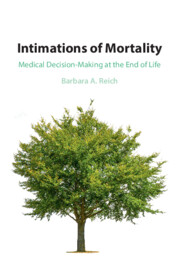Book contents
- Intimations of Mortality
- Intimations of Mortality
- Copyright page
- Dedication
- Contents
- Preface
- Acknowledgments
- 1 The Conundrum
- 2 The US Health Care ‘System’
- 3 Autonomy and Informed Consent in the Real World
- 4 The Denial of Death and Its Sequelae
- 5 Disorders of Consciousness and the Meaning of Life
- 6 More Barriers to Good Communication
- 7 Palliative and Hospice Care
- 8 Rational Apathy and the Role of Uncertainty
- 9 The Crucible
- 10 Resolving Conflicts at the End of Life
- 11 At the End of the Day
- 12 Coda
- Index
8 - Rational Apathy and the Role of Uncertainty
Published online by Cambridge University Press: 10 March 2022
- Intimations of Mortality
- Intimations of Mortality
- Copyright page
- Dedication
- Contents
- Preface
- Acknowledgments
- 1 The Conundrum
- 2 The US Health Care ‘System’
- 3 Autonomy and Informed Consent in the Real World
- 4 The Denial of Death and Its Sequelae
- 5 Disorders of Consciousness and the Meaning of Life
- 6 More Barriers to Good Communication
- 7 Palliative and Hospice Care
- 8 Rational Apathy and the Role of Uncertainty
- 9 The Crucible
- 10 Resolving Conflicts at the End of Life
- 11 At the End of the Day
- 12 Coda
- Index
Summary
The vast majority of people diagnosed with a life-threatening illness want to survive that illness. (A few will take the position that they’ve had a good long life and that treatment to prolong that life further isn’t necessary or desirable.) People in the striving for survival group – that vast majority – naturally want to make ‘good’ (i.e., rational) decisions about treatment to maximize their chances. Some patients will, early on in the process, consider the balance between surviving (increasing quantity of remaining life) and thriving (maintaining quality of life). The problem is that, as several of the preceding chapters have demonstrated, physicians and patients struggle mightily to have timely and honest conversations about the prognosis, the harms and potential benefits of treatment options, and the burdens of life-prolonging technology when the patient reaches the terminal stage of an illness.
Keywords
Information
- Type
- Chapter
- Information
- Intimations of MortalityMedical Decision-Making at the End of Life, pp. 153 - 177Publisher: Cambridge University PressPrint publication year: 2022
